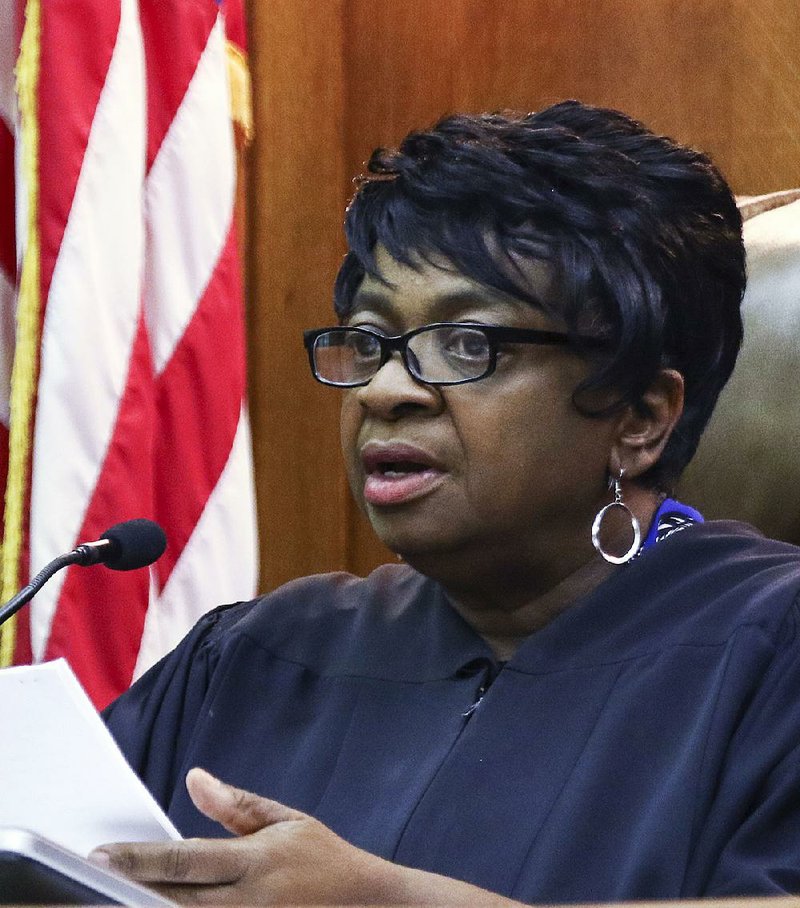The Arkansas Supreme Court on Wednesday cleared election officials to enforce the state's controversial voter-ID law in this month's primary and judicial elections.
Only last week, Pulaski County Circuit Judge Alice Gray declared the 2017 law unconstitutional, but the high court, in a one-page order, halted Gray's injunction.
Since August last year, the law -- Act 633 of 2017 -- has required voters to show government-issued identification to poll workers to ensure their votes are counted.
Secretary of State Mark Martin appealed Gray's ruling, asking the state's high court to stay the circuit judge's decision until after the May 22 election, when the matter can be fully heard. Chief Justice John Dan Kemp would've denied Martin's request, the court's order notes.
Early voting for the May 22 primary begins Monday.
Martin had asked the Supreme Court to expedite its review of the case with a federal deadline looming Friday for mailing certain absentee and overseas ballots.
"The Supreme Court's prompt attention to this matter, on an emergency basis, gives the county clerks and county boards of election commissioners reassurance that the year-long preparations for the election have not been wasted," Martin's office said in a Wednesday statement.
The law took effect in August and has governed several school board and special elections around the state, but this month's primary is the first major statewide election with the new identification requirements.
If a voter refuses to show poll workers a photo ID, he may cast a provisional ballot and submit a sworn statement verifying his identity under the penalty of perjury. Election officials may review the statement and provisional ballot to ensure it shouldn't be invalidated for any reason, or the voter may present a valid photo ID to election officials on the Monday after an election, according to the law.
Act 633 of 2017 was the Arkansas General Assembly's second stab at a voter-ID law; the courts struck down the first in 2014.
Arkansas is one of 34 states with laws requesting or requiring voters to provide some type of identification at the voting booth, and the Natural State is one of 19 to ask for photo IDs, according to the National Conference of State Legislatures.
Proponents of such measures say they discourage voter fraud and ensure the integrity of elections.
Meanwhile, opponents like poll worker Barry Haas, who sued the state over both voter-ID laws, argue that they impose burdensome, unconstitutional hurdles that disenfranchise voters.
Haas argued before Gray that some voters in Perry County have already seen their ballots go uncounted as a result of the new law. His attorney, Jeff Priebe, said they were disappointed that the law will be enforced later this month.
"We're disappointed that the secretary of state and attorney general continued to want to enforce an unconstitutional voter-ID law," Priebe said in a phone interview Wednesday. "We look forward to presenting the entire case to the Arkansas Supreme Court."
While the court halted the enforcement of Gray's ruling, it hasn't yet struck it down. The state and Haas will submit their arguments over the next 2½ months, and the Supreme Court will issue its decision in the fall.
Gray, in her order granting an injunction, sided with Haas, who argued that the law circumvented the high court's 2014 ruling.
"[Haas] is faced with the choice of complying with the unconstitutional requirements imposed by Act 633, or not having his ballot counted during the May 2018 preferential primary," Gray wrote in her 57-page order. "The court finds that this is not really a choice at all, and that irreparable harm would result to [Haas] in the absence of a preliminary injunction, as his ballot will not be counted."
The courts have yet to answer the question of whether a voter-ID requirement, on its face, violates the constitution. Instead, they've ruled that the methods by which lawmakers have enacted the laws are illegal.
Gray's order notes that the Legislature created a new voter qualification by amending Amendment 51 of the Arkansas Constitution, which addresses the voter registration process. That's the incorrect spot for the change, according to Gray.
"The Arkansas Constitution forbids the General Assembly from adding requirements to vote that are not set forth in article 3, section 1 of the Constitution," the judge wrote. "Act 633 is unconstitutional as it imposes additional requirements to vote that are not found in the Arkansas Constitution."
Attorney General Leslie Rutledge praised the state Supreme Court's Wednesday order.
"I am very pleased that the Arkansas Supreme Court agreed with the arguments we made on behalf of the State Board of Election Commissioners that the requirement that a voter show photographic identification or sign a statement affirming his or her identity as a registered voter is not burdensome and helps ensure free and fair elections," the Republican attorney said in a statement. "The stay issued this afternoon provides needed clarity for Arkansas voters and election officials."
Typically, courts will issue stays if the requesting party demonstrates a likelihood to prevail on appeal, but Priebe, Haas' attorney, said the court hadn't yet ruled on the state's arguments for the voter-ID law.
"The attorney general is entirely incorrect," he said.
Haas filed his lawsuit in February, and Martin, the Republican secretary of state, had urged Gray to issue a ruling before an April 6 deadline to mail absentee ballots to overseas and military voters, even asking the Supreme Court to step in and order Gray to issue a ruling. The April 6 deadline was for ballots for the May 22 primary and judicial elections; the deadline coming up Friday was for ballots for potential primary runoffs on June 19.
The high court declined to intervene before April 6, and Gray's ruling came three weeks after the deadline.
Asked whether Haas would provide a photo ID to vote later this month, Priebe pointed to his client's previous testimony in court.
"Mr. Haas has already testified that he will not," he said.
A Section on 05/03/2018


